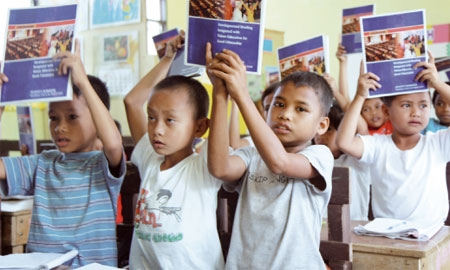“The first priority is social protection, the second is a dramatic increase in education, and the third is investments in public health, with a focus on maternal healthcare,” says Florencio Abad, Secretary of Budget and Management. “These are the areas where we have been lagging behind. In 2015, which is the final date of the MDG challenge, we should be able to meet our targets.”
At the top of the list is the reduction of poverty; according to a census in 2006, 4.6 million Filipino families live below the poverty threshold. Under a conditional cash transfer program, subsidies are being provided to families on certain conditions, such as sending the children to school and going on regular health checkups. By the end of this year, the government hopes to provide subsidies to 2.3 million families, helping the remainder by 2015.
“This administration is very serious about poverty reduction,” says Corazon Juliano-Soliman, Secretary of Social Welfare and Development. “It has demonstrated this commitment with 34% of the budget going to social services, health, education and three core poverty reduction programs.”
Spending on education – seen as the key to reducing poverty – has risen by almost 19%, the biggest increase allocated in over a decade. Huge progress has been made in providing sufficient textbooks, and resources are being focused on addressing the shortages of teachers, classrooms, and school furniture. “Everyone is keen on ensuring that these shortages are met, and there is a general consensus for educational reform,” says Secretary of Education Armin Luistro.
At the Department of Budget and Management, Mr. Abad emphasizes that government initiatives to help the poor are on their own not enough, and that the economy needs to attract local and foreign investments to spur growth via public-private partnerships. “We realize that investment in poverty reduction programs will not ultimately bring you the jobs and make the kids healthier and more educated; it is the demand coming from an expanding economy, for educated and healthier people,” he says.
Proceso Alcala, Secretary of Agriculture, says full advantage must be taken of the country’s rich potential for farming – arable farmland makes up more than 40% of the total land area. Programs are being introduced to help the nation feed itself, which the administration aims to achieve by 2013, but beyond self-sufficiency the aim is to transform agriculture into a modern, dynamic and competitive sector that can serve as a springboard for the economy. “We want to export as much as we can produce to the neighboring countries,” says Mr. Alcala. “A lot of people are saying that there is a food crisis issue, but we would like to treat this as an opportunity rather than a problem. We can use agriculture as one of the main areas where we can excel.”
As important as the development of sectors with economic potential is the need to transform government itself. President Aquino, who campaigned on the basis that without corruption there would be no poverty, has committed his administration to strict observance of the basic tenets of good governance – in particular transparency and accountability. His aim is to rebuild the people’s trust in government and encourage international investors to invest in the country.
Cesar Purisima, Secretary of Finance, says, “We have to address the issues that have held us back so that we can accelerate the country’s growth and make it sustainable, ultimately reducing poverty.” He adds, “We really need to stay focused to fight corruption; there are no quick fixes or shortcuts.”
Fiscally, the government is pursuing a more prudent management of resources and expects to lower and maintain its deficit at 2% of GDP by 2013.
At the Philippine Stock Exchange, president and chief executive officer Hans Sicat is addressing what he calls the two major challenges of limited liquidity and good corporate governance. “We are trying to promote transparency and professionalism,” he says. “Hopefully, that will improve the view of investors not just locally, but globally, as well. I think this will do wonders for the economy because we are a major part of the fundraising for companies.”
A broader perspective comes from the legendary tycoon Washington SyCip, founder of SGV Group, which represents 51 of the top 100 corporations in the Philippines for both insurance and tax auditing. “We need economic and political freedom and we have to ensure that people are educated and no longer hungry,” he says. “We need political freedom not only for the Philippines, but for the whole of Asia and developing nations.”

0 COMMENTS